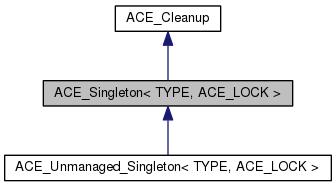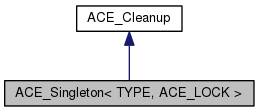|
ACE
6.1.0
|
|
ACE
6.1.0
|
A Singleton Adapter uses the Adapter pattern to turn ordinary classes into Singletons optimized with the Double-Checked Locking optimization pattern. More...
#include <Singleton.h>


Public Member Functions | |
| virtual void | cleanup (void *param=0) |
Static Public Member Functions | |
| static TYPE * | instance (void) |
| Global access point to the Singleton. | |
| static void | close (void) |
| Explicitly delete the Singleton instance. | |
| static void | dump (void) |
| Dump the state of the object. | |
Protected Member Functions | |
| ACE_Singleton (void) | |
| Default constructor. | |
Static Protected Member Functions | |
| static ACE_Singleton< TYPE, ACE_LOCK > *& | instance_i (void) |
| Get pointer to the Singleton instance. | |
Protected Attributes | |
| TYPE | instance_ |
| Contained instance. | |
Static Protected Attributes | |
| static ACE_Singleton< TYPE, ACE_LOCK > * | singleton_ = 0 |
| Pointer to the Singleton (ACE_Cleanup) instance. | |
A Singleton Adapter uses the Adapter pattern to turn ordinary classes into Singletons optimized with the Double-Checked Locking optimization pattern.
This implementation is a slight variation on the GoF Singleton pattern. In particular, a single <ACE_Singleton<TYPE, ACE_LOCK> > instance is allocated here, not a <TYPE> instance. The reason for this is to allow registration with the ACE_Object_Manager, so that the Singleton can be cleaned up when the process exits. For this scheme to work, a (static) cleanup() function must be provided. ACE_Singleton provides one so that TYPE doesn't need to. If you want to make sure that only the singleton instance of <T> is created, and that users cannot create their own instances of <T>, do the following to class <T>: (a) Make the constructor of <T> private (or protected) (b) Make Singleton a friend of <T> Here is an example:
* class foo
* {
* friend class ACE_Singleton<foo, ACE_Null_Mutex>;
* private:
* foo () { cout << "foo constructed" << endl; }
* ~foo () { cout << "foo destroyed" << endl; }
* };
* typedef ACE_Singleton<foo, ACE_Null_Mutex> FOO;
* | ACE_Singleton< TYPE, ACE_LOCK >::ACE_Singleton | ( | void | ) | [inline, protected] |
Default constructor.
| void ACE_Singleton< TYPE, ACE_LOCK >::cleanup | ( | void * | param = 0 | ) | [virtual] |
Cleanup method, used by ace_cleanup_destroyer to destroy the ACE_Singleton.
Reimplemented from ACE_Cleanup.
| void ACE_Singleton< TYPE, ACE_LOCK >::close | ( | void | ) | [static] |
Explicitly delete the Singleton instance.
Reimplemented in ACE_Unmanaged_Singleton< TYPE, ACE_LOCK >.
| void ACE_Singleton< TYPE, ACE_LOCK >::dump | ( | void | ) | [static] |
Dump the state of the object.
Reimplemented in ACE_Unmanaged_Singleton< TYPE, ACE_LOCK >.
| TYPE * ACE_Singleton< TYPE, ACE_LOCK >::instance | ( | void | ) | [static] |
Global access point to the Singleton.
Reimplemented in ACE_Unmanaged_Singleton< TYPE, ACE_LOCK >.
| ACE_Singleton< TYPE, ACE_LOCK > *& ACE_Singleton< TYPE, ACE_LOCK >::instance_i | ( | void | ) | [static, protected] |
Get pointer to the Singleton instance.
Reimplemented in ACE_Unmanaged_Singleton< TYPE, ACE_LOCK >.
TYPE ACE_Singleton< TYPE, ACE_LOCK >::instance_ [protected] |
Contained instance.
ACE_Singleton< TYPE, ACE_LOCK > * ACE_Singleton< TYPE, ACE_LOCK >::singleton_ = 0 [static, protected] |
Pointer to the Singleton (ACE_Cleanup) instance.
Reimplemented in ACE_Unmanaged_Singleton< TYPE, ACE_LOCK >.
 1.7.5.1
1.7.5.1